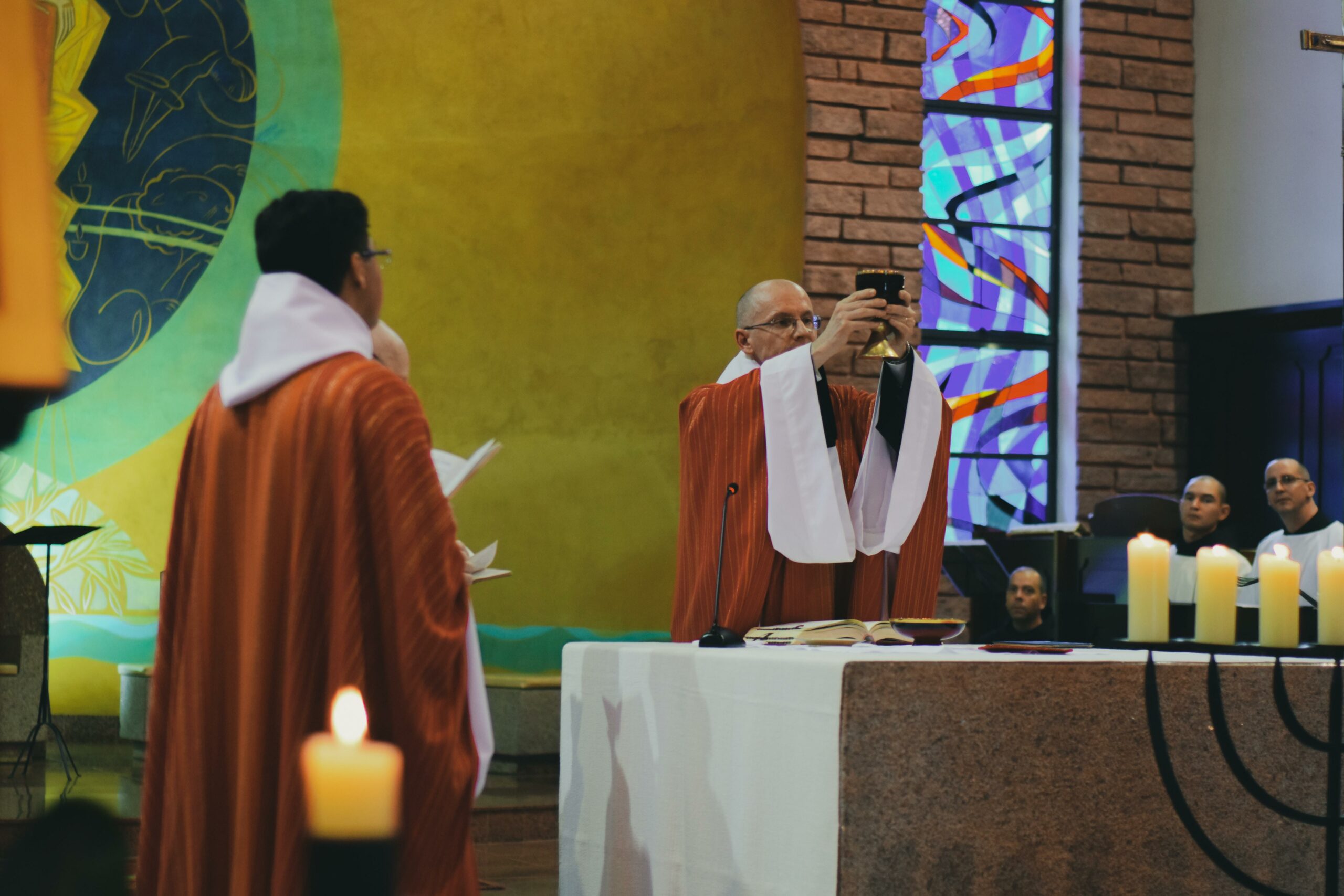In this article, we embark on a journey to explore the sacred truths behind the Eucharist, uncovering its significant facts that have transcended time and touched the lives of believers worldwide. Deeply rooted in theology, liturgy, and religious education, we dive into the core of this sacrament, shedding light on its historical and theological significance. As an experienced writer with a passion for simplifying complex concepts, I strive to bring you a comprehensive understanding of the Eucharist’s meaning, symbolism, and practices. Whether you’re a devout follower seeking a deeper connection or an eager learner hungry for knowledge, prepare to be enlightened by the important facts that await.

Important Facts about the Eucharist
When it comes to understanding the Eucharist, there are several important facts that shed light on its significance and practices. Whether you are a devoted believer seeking a deeper understanding or someone curious about the topic, exploring these facts will unveil the profound meaning behind this sacrament.
The Eucharist: A Sacrament of Thanksgiving and Divine Presence
At the core of the Eucharist lies the concept of thanksgiving. The word “Eucharist” itself comes from the Greek word eucharistia, meaning thanksgiving. This sacrament serves as a moment of gratitude and remembrance for the ultimate sacrifice of Jesus on the cross.
In Roman Catholicism, the belief of transubstantiation holds that the bread and wine used in the Eucharist actually become the body and blood of Jesus. This understanding emphasizes the divine presence within the sacramental elements. Anglicans and Lutherans share a similar belief in the real presence of God in the offering, considering it a sacrament. On the other hand, many other Protestant denominations view the Eucharist as a symbolic memorial of Jesus’ death and resurrection.
Key Point: The Eucharist holds a dual significance as an act of thanksgiving and a moment of divine presence, with different interpretations among various Christian traditions.
The Elements and Ritual of the Eucharist
During the celebration of the Eucharist, specific elements and rituals are observed, signifying the central role of this sacrament in Christian worship. The consecration of sacramental bread and wine takes place on an altar or communion table, often accompanied by prayers and liturgical readings.
The bread and wine used in the Eucharist symbolize the body and blood of Jesus, respectively. These elements are shared among the participants as a communal act of receiving the divine grace and partaking in the sacrifice of Christ.
Key Point: The Eucharist involves the use of sacramental bread and wine, which symbolize the body and blood of Jesus, and the shared act of receiving divine grace.
The Eucharist as the Source and Summit of the Christian Life
The Eucharist holds immense significance within the Christian faith, often being referred to as the “source and summit” of the Christian life. It is believed to nourish and sustain the spiritual growth of believers, providing them with strength to live out their faith in the world.
Participating in the Eucharist is considered a sacred act that deepens the individual’s connection with God and the community of believers. It serves as a reminder of Jesus’ sacrifice, a moment of renewal and transformation, and a unifying force that transcends denominational boundaries.
Key Point: The Eucharist is considered the “source and summit” of the Christian life, nurturing spiritual growth, and fostering unity among believers.
The Eucharist’s Role in the New Testament
Both historically and theologically, the Eucharist finds its roots in the New Testament. It is one of the two sacraments explicitly mentioned by Jesus – the other being baptism. In the biblical accounts of the Last Supper, Jesus instituted the Eucharist, instructing his disciples to continue this practice in remembrance of him.
Early Christian communities, following the example set by the apostles, embraced the Eucharist as a central act of worship, highlighting its essential role within the Christian tradition. This historical continuity further emphasizes the enduring significance of the Eucharist.
Key Point: The Eucharist has its origins in the New Testament and has been celebrated as a central act of worship by Christians since the time of the apostles, showcasing its enduring importance.
In conclusion, exploring the important facts about the Eucharist offers a deeper understanding of its meaning, symbolism, and practices. Whether you approach it from a theological perspective or simply seek to grasp its historical significance, the Eucharist remains a sacrament that continues to shape the lives and beliefs of countless faithful individuals.
The Eucharist stands as a moment of thanksgiving, a tangible experience of divine presence, and a source of spiritual nourishment. As we delve into its profound truths, we uncover a sacred act that transcends denominational differences and unites believers in the shared remembrance of Jesus’ sacrifice.
“The Eucharist: A sacrament of thanksgiving and divine presence, symbolized through the elements and rituals, serving as the source and summit of the Christian life, and rooted in the New Testament’s teachings – in these key facts, the sacred truths of the Eucharist are unveiled.”
Intriguing verbiage is essential when it comes to learning fascinating facts about the Eucharist. Delve into the depths of this sacred sacrament and uncover the mystical nature that surrounds it. If you’re ready to be captivated by the wonders of the Eucharist, click here: facts about the eucharist. Prepare to be amazed by the abundant knowledge awaiting you!
Important Facts About the Eucharist
Discover the profound historical significance of the Eucharist and uncover its rich roots with our comprehensive exploration. This article delves into the moments of its origin, tracing back through centuries of religious practice and symbolism. Embark on a journey through time and discover the evolution of this sacred ritual, from its ancient beginnings to its modern-day celebration. Dive into the historical significance of the Eucharist here: historical significance of the eucharist
Uncover the religious perspective on the Eucharist, where faith and devotion intertwine. Explore the beliefs and teachings surrounding this sacred sacrament, as it holds deep spiritual meaning for millions across the globe. This article offers a contemplative dive into the religious understanding and reverence for the Eucharist. Delve into the religious perspective on the Eucharist here: religious perspective on the eucharist
Expand your theological knowledge with an exploration of the multifaceted concepts of the Eucharist. Engage with the complex theological ideas and interpretations surrounding this sacred ritual. From transubstantiation to consubstantiation, this article delves into the diverse perspectives and theological debates that have shaped the understanding of the Eucharist. Enhance your understanding of theological concepts of the Eucharist here: theological concepts of the eucharist
Embark on a captivating journey of discovery as you explore the important facts about the Eucharist. Unveil its historical significance, delve into its religious perspective, and gain insight into the intricate theological concepts surrounding this sacred sacrament. By clicking on the hyperlinks above, you will embark on illuminating explorations that will deepen your understanding and appreciation for the Eucharist.
The Holy Eucharist: Understanding the Real Presence of Jesus
[youtube v=”l6yYDv5aabw”]
The Significance of the Holy Eucharist
The Holy Eucharist is an integral part of the Christian faith, representing the true presence of Jesus Christ. Derived from the Greek word “eucharistia” meaning thanksgiving, this sacrament serves as a moment of gratitude and divine connection for believers worldwide.
The Real Presence of Jesus
In Roman Catholicism, the concept of transubstantiation affirms that during the consecration in Mass, the bread and wine truly become the body and blood of Jesus. This belief, also shared by Anglicans and Lutherans, emphasizes the real presence of God within the offering.
The Symbolic Memorial
However, many Protestant denominations view the Eucharist as a symbolic memorial rather than a literal transformation. While the bread and wine maintain their physical properties, they represent the significance of Jesus’ sacrifice on the cross and serve as a reminder of his love for humanity.
Sacramental Bread and Wine
Central to the Eucharistic celebration is the use of sacramental bread and wine. These elements are consecrated by the priest during Mass, symbolizing the body and blood of Jesus. This process, known as the consecration, marks the pivotal moment when ordinary bread and wine are transformed into the sacred presence of Christ.
The Holy Eucharist: A Source of Spiritual Nourishment
The Eucharist is considered the “source and summit” of the Christian life, providing spiritual sustenance and fostering unity among believers. Through the act of Holy Communion, the faithful partake in the body and blood of Jesus, further deepening their relationship with God and one another.
An Ancient Tradition
Dating back to the time of the apostles, the origins of the Eucharist can be traced to the New Testament. It has since been commemorated throughout history, uniting Christians in the unchanging message of salvation and eternal grace.
“The Holy Eucharist epitomizes the core essence of the Christian faith, connecting believers to the divine presence of Jesus and fostering unity among those who partake in this sacred sacrament.”
FAQ
Q: What is the Eucharist?
A: The Eucharist is a central act of Christian worship practiced by most Christian churches. It involves the consecration of bread and wine, which are believed to become the actual body and blood of Jesus through transubstantiation in Roman Catholicism, while other denominations view it as a symbolic memorial.
Q: What is the significance of the Eucharist?
A: The Eucharist holds great historical and theological significance for Christians. It is considered the source and summit of the Christian life, representing the sacrifice of Jesus and his presence among believers. It serves as a means of grace, nourishment, and unity within the Church.
Q: How is the Eucharist celebrated?
A: The celebration of the Eucharist involves the consecration of bread and wine on an altar or communion table. During the Mass or worship service, these elements are blessed and distributed to the faithful, who consume them as a participation in the body and blood of Christ.
Q: Is the Eucharist a sacrament?
A: Yes, the Eucharist is considered a sacrament in many Christian traditions, including Roman Catholicism, Anglicanism, and Lutheranism. It is believed to be a sacred act instituted by Jesus, conveying spiritual grace and representing a visible sign of an invisible reality.
Q: Is the Eucharist essential to the Christian faith?
A: The Eucharist is widely regarded as an essential aspect of the Christian faith. It is seen as a way to encounter the divine presence, receive spiritual nourishment, and unite with the Body of Christ. The Eucharist, along with baptism, is recognized as one of the two sacraments established by Jesus in the New Testament.
- Mastering Leader in Spanish: The Complete Guide - April 19, 2025
- Uncovering Surprising Parallels: England Size Compared to US States - April 19, 2025
- Old Mexico Map: Border Shifts 1821-1857 - April 19, 2025
















